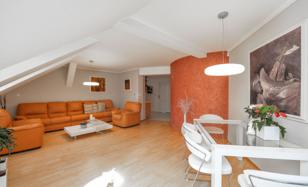Buying property in the Czech republic
The Czech Republic is popular among foreign buyers for its low prices, great scenery and fantastic architecture. There are no property restrictionson for
There are two main forms of property ownership in the Czech Republic: private ownership (osobnívlastnictví) and cooperative ownership (družstevnívlastnictví). In the case of private property, a private individual or legal entity is the legitimate owner (usually residential houses and flats). However, it is common to find apartment buildings under cooperative ownership (run by the residents). Most of these cooperatives do not accept foreign citizens according to their articles of association.
Tranio tells how it works and how can foreigners buy property in the Czech Republic:
1. Find a property. A local real estate agency offers properties that match your preferences as a buyer. The city, district and your budget are the main things to take into account. Once you have found one or more options that interest you, the agency will arrange viewings. Don’t hesitate to ask your real estate agent any questions about the property, payment procedures or potential discounts.
The agency arranges a viewing of the property upon request and you can also use a proxy (by power of attorney) to choose the property for you. If you are looking for newly built homes, you will be charged 21% VAT (daň z přidanéhodnoty, DPH) on your purchase.
2. Open a bank account. It takes about half an hour to do and will only require your passport and a €10 deposit.
3. Secure your property. You have to make a deposit of 5–10% of the purchase price and get a contract drawn up to include the payment schedule for the three months following the signing of this document. If the seller cancels the transaction, they must reimburse your deposit and pay a penalty. However, if you change your mind and decide not to buy the property, your deposit is non-refundable and cannot be used to buy any other property. Once this contract is signed, another deed formalising the deposit payment and payment procedures is executed. In order for the deposit to be remitted to the seller, the registration of the property rights must be complete.
4. Do the due diligence. You will need to obtain excerpts from the register (výpis z katastrunemovitostí) on the website or directly at the land registry offices (katastrnemovitostí). The excerpts give details concerning the owners, any sales contracts made, encumbrances etc.
5. Sign the preliminary sales contract. Although a preliminary sales contract is not compulsory, it is a mandatory requirement if you want to get a mortgage in the Czech Republic.
6. Sign the final sales contract. The final sales contract is drawn up in Czech and signed by you and the seller before being certified by a notary. At this stage, you have to pay the outstanding amount on the property. While the seller has to pay the 4% transfer tax, as the buyer, you will take care of the property registration fee (0.01–0.02%), the agency commission (2–5%) and legal fees (1% + 21% VAT).
7. Register your property. The sales contract and other documents have to be recorded with the land registry the same day as the funds are deposited to the seller's account or the escrow account. State registration takes up 45 days.
8. Get the title deed. You will have to wait another 30 days to receive your ownership certificate (list vlastnictví).
We will send you a content digest not more than once a week
- Property Prices
- Buying and Registering
- Mortgage
- Residence
- Property Maintenance
- Taxes








